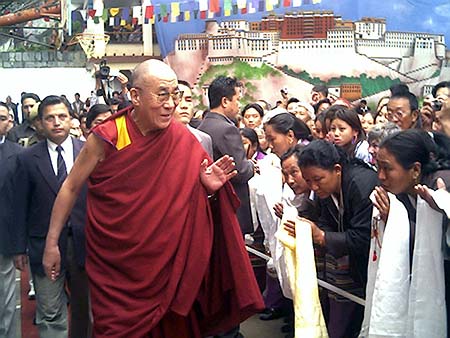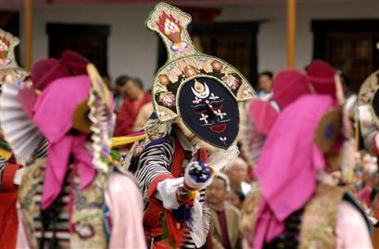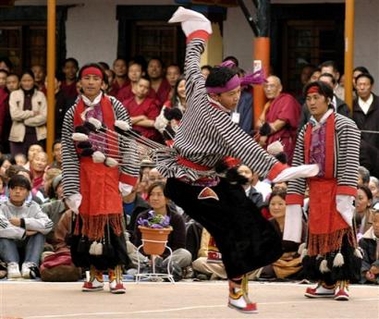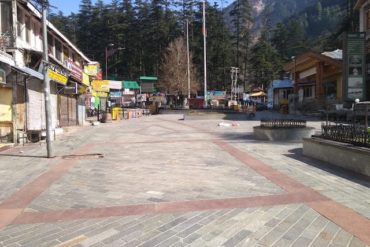Tibetan Spiritual Leader His Holiness The Dalai Lama (left) walks through a crowd of devotees as he arrives at the Tibetan Institute of Performing Arts in Dharamsala, 31 March 2006, to attend the annual Shoton Festival. Shoton literaly translates as yoghurt festival during which traditional Tibetan operas are performed and yoghurt is distributed among celebratants.
The 12th Annual Shoton-Opera Festival 2006 will be held in TIPA, Dharamsala from 31st March to 8th April 2006.
 |
There exist two main theories to explain the origins of the Shoton. In India, the Lord Buddha initiated the practice of monks going on a summer retreat. When Buddhism came to Tibet, this practice was adopted by many monasteries there. In Drepung Monastery, the summer retreat started on the 15th day of the sixth month of the Tibetan calendar. On the 30th day of the same month, the “Disciplinary Monk” was replaced. This particular occasion is called the Drepung Shoton.
Masked artists from the Tibetan Institute of Performing Arts Dharmsala perform traditional Tibetan opera in Dharmsala, India, Friday, March 31, 2006.
Continue reading ‘12th Annual Shoton-Opera Festival 2006’
 |
 |
An IT professional for 17 years, based in the US since the last 12 years. Founded NGO My Himachal and then Himachal Media Pvt. Ltd.. A Himachali forever. Always trying to bring together people whose hearts beat for the state.




http://www.newkerala.com/news2.php?action=fullnews&id=38085
Shoton, the Tibetan opera festival, becoming a favourite of youngsters in Dharamshala
By Hemant Chauhan, Dharamshala: These day people in Dharamshala are enjoying the ongoing 12th Shoton festival, regarded as annual Tibetan opera festival. Being organised by the Tibetan Institute of Performing Arts (TIPA), the nine-day long festivities have the participation of troupes from all over the country and neighbouring Nepal.
Shoton festival is aimed at showcasing Tibetan culture and spreading the teachings of the Lord Buddha through operas and theatres.
Traditionally, the “Shoton” festival is celebrated on a full moon day to mark the end of long summer retreat of monks and originated at the Drepung Monastery of Lhasa in Tibet around 14th century. Usually, the annual festival is held for a period of eight to ten days, this year it is for nine days.
According to Kalsang Dagpo, Director of the Tibetan Institute of Performing Arts (TIPA), with the passage of time the festival is witnessing a growing interest among the youngsters towards the annual festival.
“This festival is to promote Tibetan culture in-exile. Earlier, we had very few participants. But now with each passing year, we have more and more participants. Earlier we had just 20 to 25 participants from associations, now from some of the associations we have over 40 participants coming in. The number of students and children is growing rapidly,” Kalsang Dagpo said.
This year about eight groups with altogether around 380 participants are taking part in the 12th Shoton festival.
Shoton festival took its name from “Sho” or yogurt served to the monks and nuns practicing purification rituals during the time and ate no meat during full moon days. This was also the time when operatic re-enactments of stories from the life of Buddha and his previous births were held.
Earlier, hundreds of tourists and Tibetans living in exile in India converged at Dharamsala for participating and enjoying the festivities.
Earlier, Shoton had the gracious presence of Tibetan spiritual leader Dalai Lama for inaugurating the festival. His blessings on the day were regarded very highly by various participants and audiences.
The Dalai Lama, revered by Tibetans as the reincarnation of a long line of Buddhist kings, belongs to the Gelug school of Tibetan Buddhism and has been living in Dharamsala since 1959.
Artists adorned multi-hued robes and vivid masks danced to the rhythmic beating of drums and cymbals while women dressed in colourful traditional attire with elaborate headgears danced and sung in high-pitched voices captivating audiences.
Besides the 17th Karmapa Lama Ugyen Thinley Dorje, who fled Lhasa and arrived in Dharamsala in January 2000, also arrived to grace the occasion.
In Tibet, opera troupes perform Lhama, the Tibetan opera based on the lives of famous figures in Tibetan Buddhism to receive the blessings of the Dalai Lama.